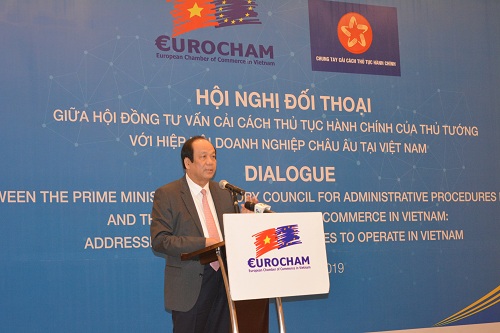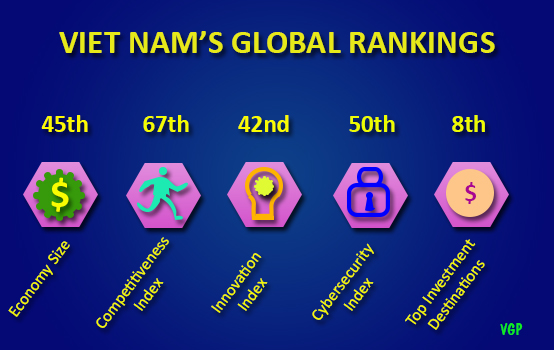EuroCham Chairman: Gov’t serious in developing open investment climate
VGP – A dialogue between the Vietnamese Prime Minister’s Advisory Council for Administrative Procedures Reform (ACAPR) and European Chamber of Commerce in Viet Nam (EuroCham) took place in Ha Noi on Thursday.
 |
|
EuroCham Chairman Nicolas Audier addresses the dialogue the Vietnamese Prime Minister’s Advisory Council for Administrative Procedures Reform (ACAPR) and European Chamber of Commerce in Viet Nam (EuroCham) in Ha Noi on December 12, 2019. Photo: VGP |
The dialogue is also a positive signal as Viet Nam and the European Union are heading to ratify their free trade and investment agreements in the first half of next year, Audier said.
 |
|
Minister-Chairman of the Government Office Mai Tien Dung speaks at the dialogue. Photo: VGP |
The Southeast Asian country is moving forward with key indices, including the global competitiveness jumping 10 places to 67th out of 141 economies.
In an effort to facilitate enterprises’ operations, the Government has given high priority to reforming administrative procedures and removing obstacles against businesses, Dung said.
The Government has put forward the revision of the Law on Investment to the National Assembly for consideration in the direction of abolishing/amending sectors subject to conditional business investment and issued three Decrees to further reduce 106 business conditions, raising the total business conditions cut to 3,451 business conditions.
Dung said the reduction of the above business conditions helps save nearly 6 million working days, or equivalent to VND 894 billion annually.
 |
|
Viet Nam's current global rankings of key indices. |
Dung said the Government has requested ministries and agencies to organize independent evaluation of cutting business conditions since 2018 and continue reviewing and abolishing unclear business conditions.
The Government chief also tasked inferior levels to carry out drastic reform of customs procedures in line with international standards, according to the Minister-Chairman.
For e-government development, Viet Nam has made initial but important step forward in this domain to contribute to improving business environment and sharpening national competitiveness, Dung said.
Last week, the national public service portal was put into operation, which is expected to deal a blow to harassments and wrongdoings in processing administrative procedures.
Ngo Hai Phan, Director-General of the Government Office’s Administrative Procedure Control Department, said that the portal is a crucial part of e-Government development, serving as platform to connect the Government with the people and businesses.
The portal consists of six components namely national database on administrative procedures and the frequently asked questions and answers related to the procedures, on-time login and verification system to connect with ministerial and provincial-level public service portals, e-payment system, opinion section for citizens and enterprises, integrated public services of ministries, agencies and localities, and online supporting services.
By Huong Giang

